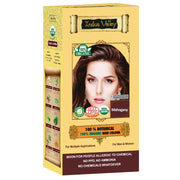Descriptifs
Herbal paint with henna, MAHOGANY, 100% organic, CERTIFIED - ECOCERT, VEGE, HALAL, 120 g, Indus Valley
2 in 1: natural colouring and intensive care!
Feel the difference in dyeing with 100% natural and eco-friendly Indus Valley henna paint.
Its unique composition consists only of herbs from organic, organic crops in the Indus Valley.
100% plant-based, without added chemicals, including ammonia and peroxides. Provides great coverage of gray hair, highlighting the natural hair color and refreshing the color of the last dye. It is gentle on the scalp.
It nourishes hair, gives it shine, moisturizes, adds volume, reduces split ends and provides a lasting and natural color effect. All this and much more thanks to the excellent composition based on the power of pure herbs.
Note: Because Indus Valley herbal hair dyes do not contain chemical brighteners, they do not lighten hair.
What makes Indus Valley herbal paints unique?
are safe, ecological and organic (EcoCert and USDA certificates),
the herbs that make up the paints are grown in a clean, uncontaminated environment of the Indus Valley - this is an advantage over other non-certified paints based on herbs and henna, which may contain heavy metals and pesticides,
Indus Valley paints nourish and strengthen hair in many different ways: they help regenerate split ends, harmonize the scalp, reduce dandruff and hair loss, moisturize dry hair, improve hair volume and stimulate hair growth, give shine and smoothness,
suitable for grey whiskers, mustaches and beards,
gentle on the scalp,
dermatologically tested,
do not contain ammonia and peroxides,
also used successfully by pregnant and breastfeeding women,
biodegradable and safe for the environment,
long persist on the hair: up to 4 weeks,
color disappears from the hair gradually, thanks to which the growths are difficult to notice,
perfectly cover gray hair - they will work perfectly when they make up 20% of all hair (for more we recommend a special dye for gray hair Indian Black).
Herbs used in herbal paints Indus Valley
Chamomile (Matricaria Chamomilla): The powder from the flowers of this plant lightens the hair and also contains apigenin, which gives the hair colors from golden to yellow.
Indigo (Indigofera Tinctoria): A vat dye obtained from dried indigo leaves; it contains indigo carmine, which gives hair colour from green to blue.
Henna shrub (Lawsonia Inermis): is an excellent basic dye used for centuries as a cosmetic, especially in hair care. In the dried leaves there is an active coloring component, lawson - gives the hair colors from orange to red.
Rubia Cordifolia: A dye containing hydroxyanthraquinone is extracted from the root and bark of the maria cordifolia and gives the hair colour from pink to red.
Amalaka (Emblica Officinalis): adds volume and shine to the hair. It can add a golden shade to your hair.
Bakopa (Bacopa Monnieri): adds health to the hair and improves memory.
Fenugreek (Trigonella Foenum Graecum): darkens hair and stimulates hair growth.
Legume (Cassia Ariculata): tannins found in its bark and leaves help to maintain colour on the hair.
2 in 1: natural colouring and intensive care!
Feel the difference in dyeing with 100% natural and eco-friendly Indus Valley henna paint.
Its unique composition consists only of herbs from organic, organic crops in the Indus Valley.
100% plant-based, without added chemicals, including ammonia and peroxides. Provides great coverage of gray hair, highlighting the natural hair color and refreshing the color of the last dye. It is gentle on the scalp.
It nourishes hair, gives it shine, moisturizes, adds volume, reduces split ends and provides a lasting and natural color effect. All this and much more thanks to the excellent composition based on the power of pure herbs.
Note: Because Indus Valley herbal hair dyes do not contain chemical brighteners, they do not lighten hair.
What makes Indus Valley herbal paints unique?
are safe, ecological and organic (EcoCert and USDA certificates),
the herbs that make up the paints are grown in a clean, uncontaminated environment of the Indus Valley - this is an advantage over other non-certified paints based on herbs and henna, which may contain heavy metals and pesticides,
Indus Valley paints nourish and strengthen hair in many different ways: they help regenerate split ends, harmonize the scalp, reduce dandruff and hair loss, moisturize dry hair, improve hair volume and stimulate hair growth, give shine and smoothness,
suitable for grey whiskers, mustaches and beards,
gentle on the scalp,
dermatologically tested,
do not contain ammonia and peroxides,
also used successfully by pregnant and breastfeeding women,
biodegradable and safe for the environment,
long persist on the hair: up to 4 weeks,
color disappears from the hair gradually, thanks to which the growths are difficult to notice,
perfectly cover gray hair - they will work perfectly when they make up 20% of all hair (for more we recommend a special dye for gray hair Indian Black).
Herbs used in herbal paints Indus Valley
Chamomile (Matricaria Chamomilla): The powder from the flowers of this plant lightens the hair and also contains apigenin, which gives the hair colors from golden to yellow.
Indigo (Indigofera Tinctoria): A vat dye obtained from dried indigo leaves; it contains indigo carmine, which gives hair colour from green to blue.
Henna shrub (Lawsonia Inermis): is an excellent basic dye used for centuries as a cosmetic, especially in hair care. In the dried leaves there is an active coloring component, lawson - gives the hair colors from orange to red.
Rubia Cordifolia: A dye containing hydroxyanthraquinone is extracted from the root and bark of the maria cordifolia and gives the hair colour from pink to red.
Amalaka (Emblica Officinalis): adds volume and shine to the hair. It can add a golden shade to your hair.
Bakopa (Bacopa Monnieri): adds health to the hair and improves memory.
Fenugreek (Trigonella Foenum Graecum): darkens hair and stimulates hair growth.
Legume (Cassia Ariculata): tannins found in its bark and leaves help to maintain colour on the hair.
Autres produits








